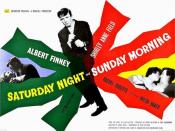I feel that this is a very complex statement that should be broken down in order to fully consider its validity. I propose to look at what I have interpreted Durgnat to mean by 'proven successes'; to which other 'media' and 'new talents' he refers; whether British cinema did, in fact, 'renew' itself; and which 'orthodox commercial procedures' he alludes to in his summary. Firstly, I have assumed that Durgnat's definition of 'proven success' to mean critical acclaim. I would consider there to be several definitions of 'success' within the field of film and cinema, from the number of awards won to spectacular audience attendance not forgetting the box office return on production costs of the film. Some films will only fall into one of these classifications whereas others may fall into more than one. With this definition in mind I have decided to focus mainly on the films Billy Liar! (1963) and Saturday Night and Sunday Morning (1960) .
Billy Liar!, originally a novel, then a play, and finally making it to the big screen followed an almost standard route for films between 1959 and 1963. The London run of Billy Liar! lasted for at least six hundred performances1 enjoying the successful adaptation of Waterhouse's novel. With previous cinema adaptations of other writers successfully under their belt, Willis Hall and Keith Waterhouse decided to turn their hand to their own work and adapted the stage play's script for film. The two scripts were almost identical with only a small number of censorious changes made to the film version. John Schlesinger, the film's director, was able to explore Billy's fantasies in more depth, bringing an extra dimension to the central character and his surroundings due to the fact that film is a far more versatile medium than theatre. For example,


